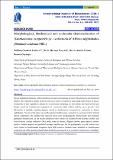| dc.contributor.author | William Omuketi Emitaro, David Mutisya Musyimi, Darius O Andika, Benson Onyango | |
| dc.date.accessioned | 2020-12-14T07:40:06Z | |
| dc.date.available | 2020-12-14T07:40:06Z | |
| dc.date.issued | 2016 | |
| dc.identifier.uri | https://repository.maseno.ac.ke/handle/123456789/3427 | |
| dc.description.abstract | African nightshade (Solanum scabrum Mill.) is one important vegetable in terms of food security and nutritional balance. The vegetable is usually medicinal and also a source of income to many small scale farmers in Kenya. Productivity of this vegetable is affected by several factors including low soil fertility and bacterial leaf spot disease caused by Xanthomonas campestris pv. vesicatoria which reduces yield by up to 40-70%. Little information is available regarding diseases caused by Xanthomonas campestris pv. vesicatoria in African nightshades. The aim of the study was to Characterize Xanthomonas campestris pv. vesicatoria from infected African nightshades. Six isolates from diseased leaves were morphologically, biochemically and molecular genetically characterized. All the isolates produced yellow colonies on modified Tween B Media (mTBM) and Yeast Dextrose Calcium carbonate (YDC) media, were rod shaped, obligately aerobic, gram negative, catalase positive, Oxidase negative and produced hydrogen sulphide gas. On the phylogenetic tree, the isolates were 100% related to Xanthomonas campestris from NCB sequence database hence identified as Xanthomonas campestris one of the species produced when Xanthomonas campestris pv. vesicatoria strains were reclassified. | en_US |
| dc.publisher | INNSPUB | en_US |
| dc.subject | African nightshades. Characterization, Solanum scabrum, Xanthomonas campestris pv. vesicatoria. | en_US |
| dc.title | Morphological, biochemical and molecular characterization of Xanthomonas campestris pv. vesicatoria of African nightshades (Solanum scabrum Mill.) | en_US |
| dc.type | Article | en_US |

